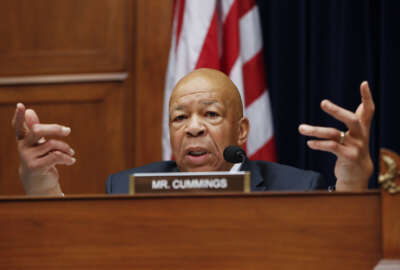
OGE ‘lacks real enforcement authority,’ but House Dems look to give it more teeth
House Democrats have put forward a sweeping executive branch ethics reform bill, part of which focuses on strengthening the independent Office of Government...
House Democrats have put forward a sweeping executive branch ethics reform bill, part of which focuses on strengthening the independent Office of Government Ethics (OGE).
House Oversight and Reform Committee Chairman Elijah Cummings (D-Md.) called the bill package one of the “one of the boldest reform packages to be considered in the history of this body” during a hearing on the legislation Wednesday.
The For the People Act would strengthen OGE’s independence, only allowing removal of the director for “inefficiency, neglect of duty, or malfeasance in office.” The bill would also allow OGE directors to continue serving beyond the length of their five-year terms until a successor has been appointed.
Walter Shaub, a former OGE director, said the agency “lacks real enforcement authority” beyond its power to make recommendations, and said HR 1 would help fill gaps in executive branch oversight.
OGE can request records and from agencies, ask agencies to conduct investigations and recommend disciplinary action. However, Shaub said OGE is “powerless” if agencies ignore requests and recommendations.
Rudy Mehrbani, senior counsel at the Brennan Center for Justice, said the bill package would make a “strong first step to restoring faith in government” and would make law what used to be longstanding presidential custom.
“Unfortunately, these common-sense practices that presidents from both parties followed for decades can no longer be taken for granted,” Mehrbani said.
The bill would implement a two-year ban on agency contracting officials receiving any compensation from vendors they may have worked with in awarding a government contract — double the period of time the law now prohibits.
Related Stories
Each Congress, the House majority party typically reserves HR 1 for its legislative priority. In 2017, House Republicans introduced HR 1 as a tax reform bill that later became the Tax Cuts and Jobs Act, which Trump signed into law in December 2017.
Committee Republicans, however, pushed back on the scope of the Democratic bill — which also includes sections on campaign finance reform and voting rights — and expressed doubt about it gaining enough traction to become law.
“It’s not a stretch to call many of these proposals radical,” ranking member Jim Jordan (R-Ohio) said.
Bradley Smith, the chairman of the Institute for Free Speech, said HR 1 amounted to a “grab bag” of disparate legislative ideas that should be broken into smaller bills.
HR 1 also includes the Transition Team Ethics Improvement Act, introduced by Sens. Tom Carper (D-Del.) and Elizabeth Warren (D-Mass.) which would require presidential transition teams to have an ethics plan in place and available to the public.
Scrutiny intensifies over Trump Hotel
Before leaving office in July 2017, Shaub urged Trump to fully divest his stake in the Trump Hotel.
“People are paying money to the Trump Organization to use his facilities, and the direct beneficiary of that money is President Trump, because he’s the beneficiary of the trust that holds that,” Shaub said. “So the money is flowing to President Trump and the steps he’s taken to step back from it have had absolutely zero effect to, in any way, diminish the financial interest and the money that comes through.”
The lease Trump holds with the General Services Administration for the Old Post Office site has only attracted more scrutiny in recent years.
GSA’s inspector general, in a report released last month, claimed GSA “ignored” steps in determining whether Trump’s lease on the Old Post Office would pose a violation of the U.S. Constitution’s emoluments clause.
Earlier this week, Rep. Jim Jordan and Sen. Ron Johnson asked GSA IG Carol Ochoa to turn over documents to support those claims.
The attorneys general for Maryland and the District of Columbia have filed a lawsuit challenging whether Trump, under the emoluments clause of the U.S. Constitution, can benefit from foreign governments doing business with the Trump Hotel.
A District Court judged allowed the lawsuit to move forward last November, after he denied a Justice Department request to stay the proceedings.
Copyright © 2025 Federal News Network. All rights reserved. This website is not intended for users located within the European Economic Area.
Jory Heckman is a reporter at Federal News Network covering U.S. Postal Service, IRS, big data and technology issues.
Follow @jheckmanWFED





